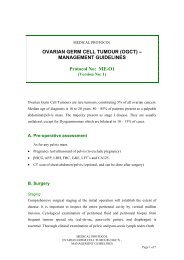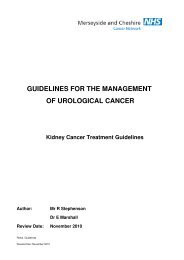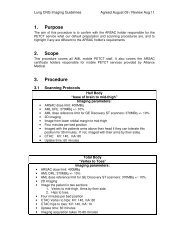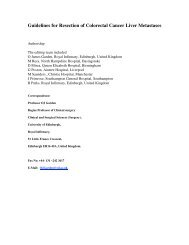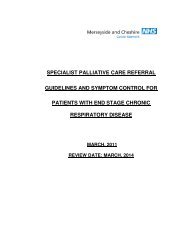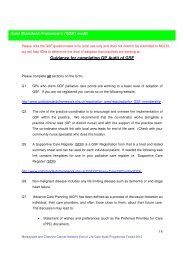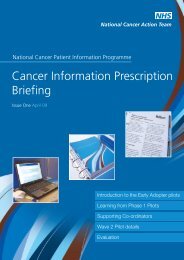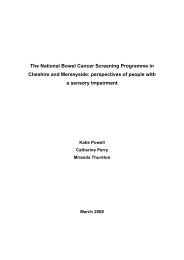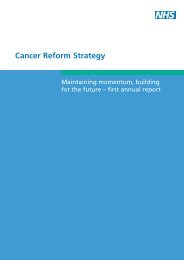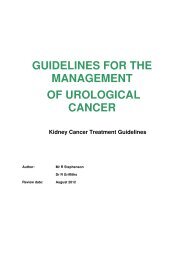Cancer Reform Strategy - NHS Cancer Screening Programmes
Cancer Reform Strategy - NHS Cancer Screening Programmes
Cancer Reform Strategy - NHS Cancer Screening Programmes
- No tags were found...
Create successful ePaper yourself
Turn your PDF publications into a flip-book with our unique Google optimized e-Paper software.
CHAPTER 1: THE CHALLENGE OF CANCER 25●●●Stronger commissioning – this strategy isdesigned to support commissioners inplanning and providing high quality cancerservices which reflect the needs of the localpopulation;Appropriate funding – appropriate fundingwill be provided to build world class cancerservices but commissioners will need toensure that money is well spent; andBuilding for the future – we need to buildon the progress we have seen in cancerresearch in recent years, including developinga new national repository of cancer data andenhancing research efforts in areas whereknowledge is lacking. We also need goodplanning to provide a skilled and flexiblecancer workforce for the future and todeliver high-quality facilities andenvironments for cancer care.1.20 This strategy has been developed inparallel with an End of Life Care <strong>Strategy</strong>,covering cancer and other conditions, which isanticipated to be published in parallel with thefinal report of the <strong>NHS</strong> Next Stage Review.To avoid duplication only those aspects of endof life care which are specific to cancer arecovered in this strategy.Development of the strategy1.21 Large numbers of individuals andorganisations have been involved in thedevelopment of the <strong>Strategy</strong>. These include:●●●●●Members of the Advisory Board and WorkingGroups;Clinicians and managers working throughoutthe <strong>NHS</strong>;Patients, including through a workshopspecifically for service users;Social care representatives;<strong>Cancer</strong> charities; and1.22 Many groups have devoted a great deal ofconstructive thought to how cancer policyshould develop to address the challengesoutlined above. For example:●●●We asked groups of experts, consisting ofhealthcare professionals, researchers andpatient representatives, to develop realisticvisions of how they believe services forparticular cancers could develop by 2012(see Box 2);Existing Department of Health advisorygroups on lung cancer & mesothelioma,bowel cancer, prostate cancer and children& young people with cancer met to discusstheir visions for cancer in 2012;The <strong>Cancer</strong> Campaigning Group, a coalitionof over 30 national cancer charities, publisheda report Getting it right for people withcancer: What the voluntary sector wants fromthe <strong>Cancer</strong> <strong>Reform</strong> <strong>Strategy</strong>, setting out somekey principles on which future policy shouldbe developed (see Box 3);● <strong>Cancer</strong> Research UK has developed its 2020goals (see Box 4);●●●●<strong>Cancer</strong> 52, an alliance of charities whichsupport people with less common cancers,has come together to consider what stepsneed to be taken to improve outcomes forthese cancers;The All-Party Parliamentary Group on <strong>Cancer</strong>published its ‘New Vision for <strong>Cancer</strong>’;Tumour-specific coalitions, such as theProstate <strong>Cancer</strong> Charter for Action and theUnited Kingdom Lung <strong>Cancer</strong> Coalition haveidentified areas for prioritisation in tacklingspecific cancers;The Academy of Medical Royal Collegesformed the Inter-Collegiate <strong>Cancer</strong>Committee to provide health professionals’perspectives on cancer policy;●Healthcare industry organisations.●The NCRI has consulted widely on cancerresearch needs and opportunities;



